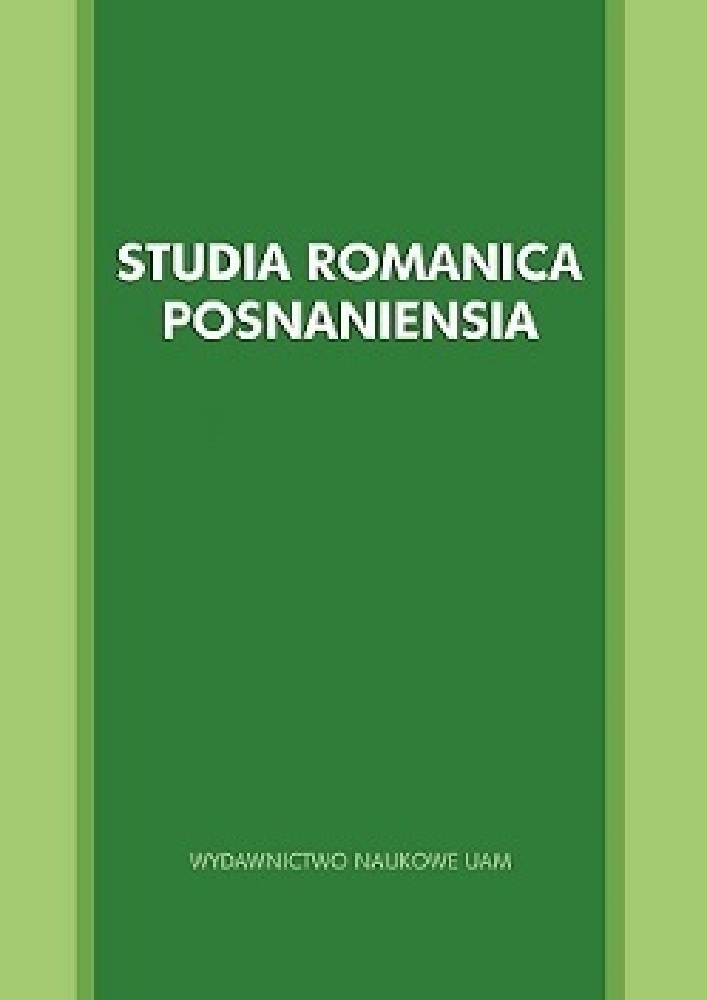Abstrakt
The aim of the article is to show the role of the prefixe post in the construction of discursive identity of actors described with a country name or its reformulation in the French media discourse. The observation of uses of this prefixe added to the the adjective sovétique (Soviet), which completes a proper name or its discursive reformulation (such as état/pays/espace – state/country/space), allowed to distinguish the most common effects of the use of post: the referential blurring, which contributes to the creation of the collective identity of the agents, the memorial character of the adjective postsoviétique, which constructs the discursive identity of agents by constantly recalling the past, as well as the appearance of the adjective in proximity to axiologically marked structures.
Bibliografia
Amiot, D. (1997). Attribution des valeurs « continue » et « discontinue » aux adjectifs préfixes par -pré. In L’antériorité temporelle dans la préfixation en français (pp. 215-258). Paris: Septentrion. DOI: https://doi.org/10.4000/books.septentrion.116335
Amiot, D. (2003). De l’antériorité à la postériorité: mode de repérage temporel et type de préfixes. Cahiers Chronos, 11, 173-189. DOI: https://doi.org/10.1163/9789004487161_012
Gary-Prieur, M.-N. (1991). La modalisation du nom propre. Langue française, 92, 46-63. DOI: https://doi.org/10.3406/lfr.1991.6211
Gary-Prieur, M.-N. (2009). Le nom propre, entre langue et discours. Les Carnets du Cediscor, 11, 153-168. DOI: https://doi.org/10.4000/cediscor.825
Guérin, O., Lecolle, M. & Veniard, M. (2018). Présentation. Langages, 210, 5-16. DOI: https://doi.org/10.3917/lang.210.0005
Lecolle, M. (2015). Nom propre de lieu habité: polyvalence et polysignifiance. In B. Le Corre-Schnabel & J. Löfström. Challenges in synchronic toponymy: Structure, Context and Use/ Défis de la toponymie synchronique: Structures, contextes et usages (pp. 219-234). Tübingen : Francke Attempto Verlag.
Lecolle, M., Paveau, M.-A. & Reboul-Touré, S. (2009). Les sens des noms propres en discours. Les Carnets du Cediscor, 11. DOI: https://doi.org/10.4000/cediscor.736
Mortureux, M.-F. (1993). Paradigmes désignationnels. Semen, 8. DOI: https://doi.org/10.4000/semen.4132
Münchow, P. von (2019). Quel « Soi » et quel « Autre » ? Une étude de la construction discursive de l’appartenance dans les manuels d’histoire français et allemands. Langage et société, 2/167, 145-174. DOI: https://doi.org/10.3917/ls.167.0145
Neveu, F. (2004). Dictionnaire des sciences du langage. Paris : Armand Colin.
Nowakowska, M. (2006). Les adjectifs ethniques sont-ils des adjectifs de relation? Neophilologica, 18, 59-69.
Paveau, M.-A. (2006). Les prédiscours. Sens, mémoire, cognition. Paris : Presses Sorbonne nouvelle. DOI: https://doi.org/10.4000/books.psn.722
Paveau, M.-A. (2011). Quelles données entre l’esprit et le discours ? Du préconstruit au prédiscours. In
A. Azouzi (éd.), L’analyse du discours. Notions et problèmes (pp. 19-37). Jendouba : Éditions Sahar. https://hal.science/hal-00596737/document.
Rastier, F. (2001). Arts et sciences du texte. Paris : PUF. DOI: https://doi.org/10.3917/puf.rast.2001.01
Siblot, P. (1987). De la signifiance du nom propre. Cahiers de praxématique, 8. DOI: https://doi.org/10.4000/praxematique.3495
Sinclair, C. & Hayes, S. (2019). Between the Post and the Com-Post: Examining the Postdigital ‘Work’ of a Prefix. Postdigit Sci Educ, 1, 119-131. DOI: https://doi.org/10.1007/s42438-018-0017-4
Licencja
Prawa autorskie (c) 2024 Agata Rębkowska

Utwór dostępny jest na licencji Creative Commons Uznanie autorstwa – Użycie niekomercyjne – Na tych samych warunkach 4.0 Międzynarodowe.
- Autor oświadcza, że przysługują mu osobiste i majątkowe prawa autorskie do Utworu oraz że nie są one ograniczone w zakresie objętym niniejszą Umową, oraz że utwór jest dziełem oryginalnym i nie narusza majątkowych lub osobistych praw autorskich innych osób.
- Autor udziela Uniwersytetowi im. Adama Mickiewicza w Poznaniu niewyłącznej i nieodpłatnej licencji na korzystanie z Utworu bez ograniczeń terytorialnych i przez czas nieokreślony na następujących polach eksploatacji:
2.1. wytwarzanie określoną techniką egzemplarzy Utworu, w tym techniką drukarską, reprograficzną, zapisu magnetycznego oraz techniką cyfrową;
2.2. wprowadzanie do obrotu, użyczenie lub najem oryginału albo egzemplarzy Utworu;
2.3. publiczne wykonanie, wystawienie, wyświetlenie, odtworzenie oraz nadawanie i reemitowanie, a także publiczne udostępnianie Utworu w taki sposób, aby każdy mógł mieć do niego dostęp w miejscu i w czasie przez siebie wybranym;
2.4. włączenie Utworu w skład utworu zbiorowego;
2.5. wprowadzanie Utworu w postacie elektronicznej na platformy elektroniczne lub inne wprowadzanie Utworu w postaci elektronicznej do Internetu, Intranetu, Extranetu lub innej sieci;
2.6. rozpowszechnianie Utworu w postaci elektronicznej w Internecie, Intranecie, Extranetu lub innej sieci, w pracy zbiorowej jak również samodzielnie;
2.7. udostępnianie Utworu w wersji elektronicznej w taki sposób, by każdy mógł mieć do niego dostęp w miejscu i w czasie przez siebie wybranym, w szczególności za pośrednictwem Internetu, Intranetu, Extranetu lin innej sieci;
2.8. udostępnianie Utworu zgodnie z wzorcem licencji Attribution-NonCommercial-ShareAlike 4.0 International (CC BY-NC-SA 4.0) lub innej wersji językowej tej licencji lub którejkolwiek późniejszej wersji tej licencji, opublikowanej przez organizację Creative Commons. - Autor zezwala Uniwersytetowi im. Adama Mickiewicza w Poznaniu na:
3.1. nieodpłatne korzystanie i rozporządzanie prawami do opracowań Utworu i tymi opracowaniami.
3.2. wysyłanie metadanych Utworu oraz Utworu do komercyjnych i niekomercyjnych baz danych indeksujących czasopisma. - Autor upoważnia i zobowiązuje Uniwersytet im. Adama Mickiewicza w Poznaniu do udzielania osobom trzecim dalszych licencji (sublicencji) do Utworu oraz do innych materiałów, w tym utworów zależnych lub opracowań zawierających lub powstałych w oparciu o Utwór, przy czym postanowienia takich sublicencji będą tożsame z wzorcem licencji Attribution-NonCommercial-ShareAlike 4.0 International (CC BY-NC-SA 4.0) lub innej wersji językowej tej licencji lub którejkolwiek późniejszej wersji tej licencji, opublikowanej przez organizację Creative Commons Tym samym uprawnia wszystkich zainteresowanych do korzystania z utworu wyłącznie w celach niekomercyjnych pod następującymi warunkami:
4.1. uznanie autorstwa czyli obowiązek podania wraz z rozpowszechnionym utworem informacji, o autorstwie tytule, źródle (odnośniki do oryginalnego utworu, doi) oraz samej licencji;
4.2. na tych samych warunkach, wolno rozpowszechniać utwory zależne jedynie na licencji identycznej to tej, na jakiej udostępniono utwór oryginalny. - Uniwersytet im. Adama Mickiewicza w Poznaniu jest zobowiązany do:
5.1. udostępniania Utworu w taki sposób, aby każdy mógł mieć do niego dostęp w miejscu i w czasie przez siebie wybranym bez ograniczeń technicznych;
5.2. poprawnego informowania osób, którym Utwór będzie udostępniany o udzielonych im sublicencjach w sposób umożliwiający odbiorcom zapoznanie się z nimi.
Pozostałe postanowienia
- Uniwersytet im. Adama Mickiewicza w Poznaniu zachowuje prawo do czasopisma jako całości (układ, forma graficzna, tytuł, projekt okładki, logo itp.).

